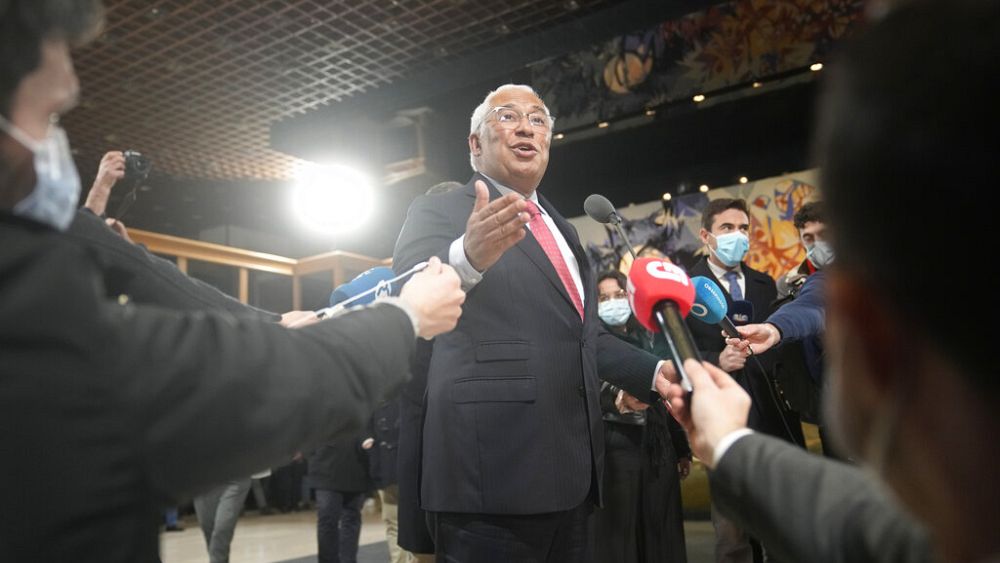
Portugal’s Socialist party (PS) won Sunday’s parliamentary election but uncertainty remains as to whether it will be able to govern alone.
With more than 98.7% of the votes counted, the PS, lead by Prime Minister Antonio Costa, had secured 41.69% of the vote, 13 percentage points higher than their nearest rival, the centre-right Social Democratic Party (PSD).
The snap election was triggered two months ago when lawmakers rejected the minority Socialist government’s spending bill and the country’s president dissolved parliament.
Turnout stood at more than 57.8% — nine percentage points higher than in 2019 despite the COVID-19 pandemic. About a tenth of the population was in isolation over the weekend because they were either infected or considered risk contacts. Early voting was rolled out to allow people to cast their ballot last Sunday while people under quarantine were asked to attend their polling stations at the end of the day to minimise contact with other people.
Here are the main take-aways from this election
Socialists cement power but may not get absolute majority
Support for the PS grew from 36.7% in 2019 to 41.7% this time around.
Back then, this gave them 108 seats — not enough to secure a majority in the 230-seat Assembly. It is yet unclear whether this increased support will allow them to have an absolute majority although the prospect appears unlikely.
It might therefore have to rely once more on the Left Bloc (BE) and the Communist/Green coalition (PCP/PEV) which withdrew their support in November over the annual state budget and disagreements about public health spending.
For political analyst and journalist Miguel Szymanski, the outcome of the election suggests that “the Socialist Party’s strategy that triggered the snap election seems to have worked out fine: the two parties on the left were punished, the main opposition party did not benefit from it as (PSD leader) Rui Rio and the main opposition PSD expected.”
“It was all about the right timing to escape the fragile position Costa’s minority government was in,” he added, with the centre-left party benefiting from “a very successful vaccination campaign; the main opposition leader was being contested by a strong rival; the president was fully aligned with the government; the government spent millions supporting media businesses over the last two years.”
Smaller left-wing parties punished
BE, which came in third in 2019 with 9.59% of the vote, failed to secure even half of that on Sunday with 4.4% of votes to come in fifth.
PCP/PEV also saw its support slip by two percentage points to 4.31% since the last election two years ago.
These results should see the Left Bloc take three to ten seats and the Communist/Green coalition between three and eight.
So even though the Socialists may end up needing them if they fail to get an outright parliamentary majority, their position has been weakened.
“One of the main reasons for the snap election was that there are many EU billions to be spent over the next years and the government wants to keep control of that ‘mother of all piles of money’,” Szymanski told Euronews.
“Neither the prime minister nor the president wanted far-left parties to have a strong saying on how to spend the money from Brussels,” he explained.
Additionally, the Socialists, if they fail to get a majority, may get boosts from the Social Democrats.
“PS and PSD still have a lot in common, they share the political centre,” Szymanski flagged. “And they will have to compromise regularly as the left parties and the Socialist Party break off their relationships in a nasty way.”
Ring-wing and far-right makes strong gains
The Chega! (Enough!) populist party launched in April 2019. Six months later it secured 1.25% of the vote and one parliamentary seat.
Now, it will become the third biggest party in parliament after securing over 7% of ballots. This could give the party between six to 14 elected members.
“Chega, a xenophobic party led by a far-right populist, will be the main opposition party in Portugal whenever PS and PSD vote a bill together,” Szymanski told Euronews.
Iniciativa Liberal (IL), a right-wing party also created in 2019 when it successfully entered parliament with one seat, saw its support quadruple to 4.67% to take the fourth place in these elections.
For Szymansk, the results seem to show that “there seems to be simultaneously a desire for change and a fear to move away from the centre as the three smaller, traditional parties like the Communists (PCP), Left Bloc (BE) and CDS were all punished by the electorate, but new parties like Chega and Iniciativa Liberal (IL) got more votes than four years ago.”